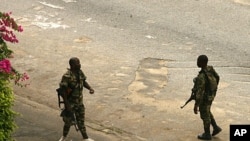Fighting between forces loyal to Ivory Coast's rival presidents continued for a fourth day in Abidjan, as French troops took control of the city's airport.
Embattled incumbent leader Laurent Gbagbo clung to power yet another day Sunday, while sporadic gunfire was heard on the mostly deserted streets of Abidjan.
France said it has sent in additional troops and secured the airport with U.N. peacekeeping forces, as it continues to shelter more than a thousand foreign nationals at a camp outside the city.
Abidjan has been in lockdown since forces loyal to Gbagbo's rival, Alassane Ouattara, infiltrated the city Thursday and began a final effort to remove Gbagbo from office.
Gbagbo has rejected all demands to step down since Ouattara was declared the winner of Ivory Coast's November presidential election.
The incumbent leader is still drawing support from a band of loyal forces, including the Young Patriots, a youth arm known for its use of violence and fiery rhetoric.
"At the cost of our blood, we are going to die so that the republic survives, for our children," said an armed member of the group, who identified himself as General La Poudriere.
But the deputy chief of staff of Ouattara's Republican Forces said he was not shaken by such talk.
"It's not the young patriots who worry us," he said. "They're not an army. They are all words."
For now, the Young Patriots are protecting the presidential palace and state television, which broadcast footage of Gbagbo as well as pleas for additional forces to back him.
Human rights groups are urging both sides to avoid civilian casualties. Their warnings came after a grisly report from the Red Cross and Catholic charity Caritas, saying between 800 and 1,000 people were massacred in western Ivory Coast last week. The bodies were found in an town that rebel forces had captured, though it was not clear who was culpable.
In an interview last week, a spokesman for the U.N. Human Rights Office, Rupert Colville, said it appears some of Ouattara's forces may have been involved in abuses.
“Again it's not particularly surprising," said Colville. "You've got armed forces moving through the country with battles going on in various places, but some of the people on his side appear to be stepping way beyond the bounds of what's acceptable.”
Colville warned that both sides will be held accountable for any violations of international humanitarian law.
Battle for Abidjan Rages on in Ivory Coast




